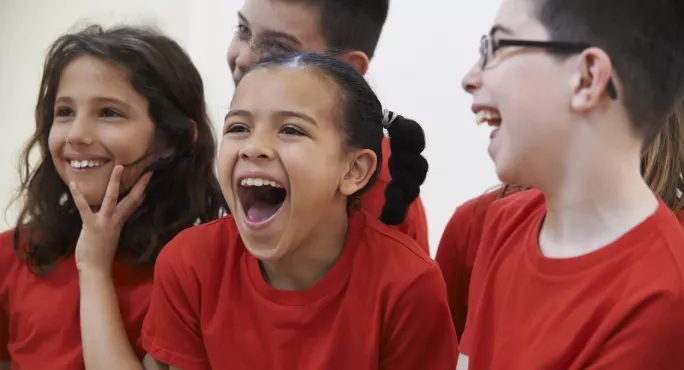What do we need when things go back to normal? Laughter

When the Second World War was declared in 1939, a Mickey Mouse cartoon was running on BBC television. Suddenly, it was stopped midflow.
Then, when the war ended in 1945, the cartoon was shown again. Except that it was restarted at exactly the same point at which, six years earlier, it had been paused.
Life, the BBC seemed to be implying, was now proceeding as normal. The interruption was over.
I’ve been thinking about this story (told in Julie Summers’ charming book When the Children Came Home) because one day our interruption will be over - this wretched Covid crisis - and some normality will be finally restored.
But, in the meantime, I’m not sure that all the catastrophic language about a “damaged generation” or talk of apocalyptic levels of lost learning is doing any of us any good - certainly not our children and young people, who must feel they are about to be consigned to a never-ending hamster wheel of narrowed curriculum and mandatory catch-up clubs.
Which is why I turn to history.
Coronavirus: lessons from history
Back in the Second World War, there were three phases of educational disruption for 3 million British children. At three points in the war (1939, 1940 and 1944), they were evacuated from their normal homes and schools as part of a government initiative known as Operation Pied Piper.
And then, just as now, people were quick to criticise a government that looked as though it was on the back foot, and which thought in terms of systems rather than the human impact.
As a correspondent in The Times wrote in January 1940: “Whitehall did not foresee a complete and prolonged dislocation of normal education.”
I’m guessing there may have been people who used that “lost generation” language that we hear too much of today. But the reality is that some evacuees thrived during evacuation, just as others had bleakly miserable times.
Ronald Miller, for example, thrived: “The experience broadened my character immensely, taught me that there was much more to my country than the suburbs of London and showed me the essential goodness of people. These things have never left me.”
The importance of a rich, balanced curriculum
So, I’m hoping that, once we begin to welcome more children and young people back into our schools and colleges from 8 March, we give them space to reacquaint themselves with the rhythms and rituals of education.
I hope we’ll see the importance of maintaining a broad, rich, balanced curriculum. I hope we’ll remember the distinctive power of the arts and of sport in each young person’s renewed educational experience. I hope we’ll see the reemergence of school plays and concerts, charity dressing-up days, debating competitions and laughter - lots of laughter.
Instead of fixating on a deficit model of learning, I hope we’ll focus on the quality of what young people need, rather than the quantity. I hope we’ll declutter our education system from its detritus of performance tables, obsession with exams, and inspections. I hope we’ll just let teachers teach.
And, of course, there will be individual pupils who will need additional teaching, in small group and one-to-one sessions.
But there will also be many who won’t need such things. What they’ll need more than anything is the skill and knowledge - the expertise and empathy - of an older generation who can motivate, inspire, skilfully assess, explain, encourage and cajole. This is what great teachers do, and they do it best when trusted to do so.
All of which will, of course, to some be perceived as an example of my complacency: a misguided failure to engage with that “lost generation” narrative. I’ll be written off as either overly optimistic, or insufficiently pessimist.
But in truth, I’m with the American scientist Amory Lovins. He said: “I am neither an optimist not a pessimist, because they are just two different forms of fatalism. The optimist says things have to get to better, and the pessimist says things have to get worse. I believe in applied hope. Things can get better, but you have to make them so.”
Therefore, while I welcome the appointment of Sir Kevan Collins as education recovery commissioner, and welcome additional resources and initiatives to target support where it is needed for the young people who need it most, I also hope no one thinks there’s a cavalry outside our schools waiting to ride in to the rescue.
What our young people need now are education experts who know them best. One day soon they will be back in our schools and colleges, weaving their distinctive magic.
Our teaching profession: for me, that’s where the applied hope lies.
Geoff Barton is general secretary of the Association of School and College Leaders
Register with Tes and you can read two free articles every month plus you'll have access to our range of award-winning newsletters.
Keep reading with our special offer!
You’ve reached your limit of free articles this month.
- Unlimited access to all Tes magazine content
- Save your favourite articles and gift them to your colleagues
- Exclusive subscriber-only stories
- Over 200,000 archived articles
- Unlimited access to all Tes magazine content
- Save your favourite articles and gift them to your colleagues
- Exclusive subscriber-only stories
- Over 200,000 archived articles